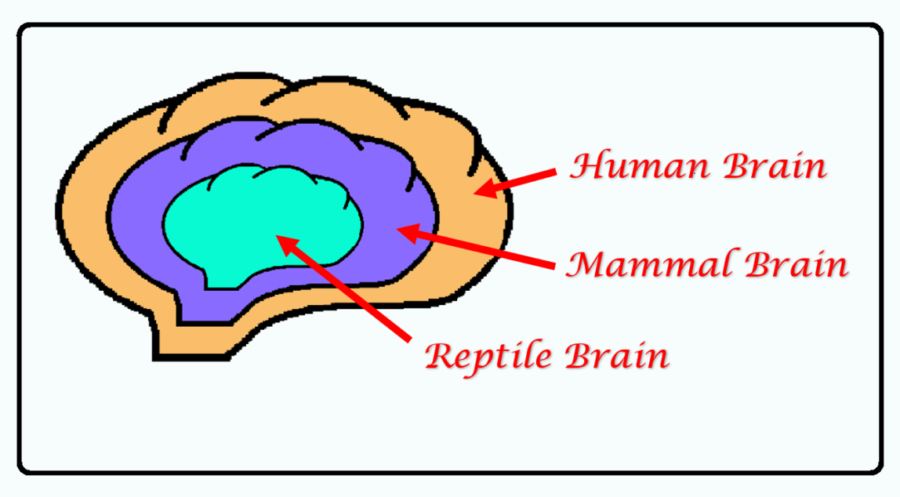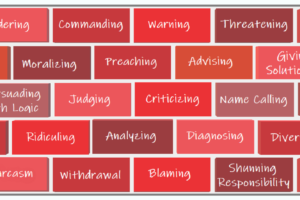The Three Brains
Did you know you were born with three brains? Well, not literally, but figuratively! The concept of Three Brains is not a scientific representation of brain chemistry or the pathways the brain takes to process information. It is a visual metaphor for conceptualizing three distinct ways our brain responds to stressful events.
For example, if you are processing information in your human brain, you are being proactive and looking at all of the long term rewards and consequences of a behavior. If you are processing information in your mammal brain, you are existing, going with the flow, you are in survival mode. If you are in your reptile brain, you are reacting to stimuli around you.
How you process information will have an impact on your successes in life.
Your Human Brain
When you are processing information in your human brain you receive information through a filter of feeling optimistic and productive. You are able to solve complex problems and perform critical thinking. You have goals in life that you feel confident you can accomplish. You have a 401K or other formalized retirement plan. You live life looking forward to the adventure of where life will take you. When you are in your human brain:
- You are flourishing.
- You are strong.
- You control your destiny.
- You are able to solve complex problems.
- You look forward with anticipation to what the future will bring.
- You have intimate, close, caring relationships in which there is love, honesty, commitment and vulnerability.
When you are in your human brain you tend to spend regular quality time with family and friends, you spend most of your time having experiences or participating in a hobby rather than watching TV. You physically take care of yourself by hydrating, eating well, sleeping comfortably and being active.
Your Mammal Brain
When you are processing information “in your mammal brain” you receive information through a filter of resignation and existence, of “going with the flow”. You are able to solve simple problems. You look forward to more immediate events, for example, your plans for the upcoming weekend. Your retirement plan is Social Security. Being in your mammal brain is living a philosophy of “it is what it is”. When you are in your mammal brain:
- You are functioning.
- You are in survival mode.
- You feel others are in control of your life (parents, teachers, spouse, boss, the legal system, etc.).
- You “put one foot in front of the other”.
- You may be in a relationship, but it is one of co-existing. Trust, communication and a sense of romance are elusive.
- You live for today without much thought to the future.
When you are in your mammal brain your socialization is limited to a very small group, expanding your mind consists of finding a new TV series to watch and your meals are probably fast foods or processed foods.
Your Reptile Brain
When you are processing information “in your reptile brain” you receive information through a filter of escapism and pessimism. You live your life in passive resistance to the rest of the world. You are not focused on solving problems, but of just “getting by”. Your retirement plan is playing the lottery. Living in your reptile brain includes a complex web of skepticism, despair and insecurity. When you are in your reptile brain:
- You are floundering.
- You react to events around you.
- You feel powerless and hopeless.
- You frequently struggle to maintain a relationship, a job, or stable housing.
- You live life with the philosophy of “one step forward, and two steps back.”
- You use primitive escape coping skills
These primitive coping skills include:
- Fight: You don’t “play nicely” with others. You are often irritable and have a hard time maintaining a long-term relationship or job.
- Flight: You “escape”. You don’t answer the phone and rarely attend family holiday celebrations (isolation). You may drink alcohol to excess, smoke too many cigarettes and indulge yourself with comfort foods high in carbs and sugar (chemical escape). You go from one relationship to another, home to home, and job to job (geographic cure). You spend hours listening to music, reading a book, watching movies or playing video games (emotional escape).
- Freeze: You do nothing, you don’t make any decisions. You live your life feeling like “a deer in headlights”.
- Frenzy: You deliberately keep yourself busy so you don’t have time to think. You are the first to volunteer to work overtime. You are a compulsive “neat freak”. Anything to stay busy so you do not have to think.
- Fawning: You become a “people pleaser”. You find it almost impossible to say no. You ignore your own needs, values and boundaries to make others happy.
When you are in your reptile brain, socialization is avoided. You will engage in escapism from reality in the form of food, alcohol or binge-watching Netflix. You “graze” instead of eating meals, sleep is elusive, with little to no planned physical activity.
Example:
Terry works 12 hour shifts as an ICU nurse at the local hospital. It is a job requiring Terry to balance paying attention to detail with patients, demonstrating compassion with family members, and interacting with peers in a professional manner. During work Terry is processing information in a human brain.
The 45 minute drive home is one of “autopilot”. Terry takes the same route home, carefully observing the rules of the road. It is all so routine that Terry couldn’t even recall pushing the garage door clicker to open or close the garage door. It is about getting home. Now. This is processing information in a mammal brain.
Once at home, Terry turns on the TV and while watching a recorded rerun of the People’s Court, Terry eats half a pint of Haagen-Dazs ice cream. This is an example of being in a reptile brain.
As Terry is finishing the half pint of ice cream, there is a realization that eating ice cream isn’t a very healthy meal. Terry then goes out to the kitchen, starts drinking a glass of water and prepares a healthy meal. Terry recognized the reptile brain behavior (eating ice cream for supper) and makes the conscious decision to move back to the human brain (Terry drinks water and eats a well-balanced meal).
Take-away Points
Sometimes it is not easy to be in your human brain. It is easier to open the container of ice cream than it is to make a well-balanced meal!
However, it isn’t “bad” to sometimes be in your reptile brain when you just need to “shut down and regroup”. The idea is to be in your human brain as much as possible by being self-aware (recognizing when we are in our reptile brain) and by using coping skills (using skills to return to the human brain).
When you recognize which brain you are in, human, mammal or reptile, you can do something about it.
To read more about the Three Brains, read my article on my website Three Brains: What is The Figurative Concept?
Thank you so much for reading this blog. If you enjoyed the content, please check out other blogs at:
https://relationshipsrelearned.com/my-blog/
https://rvingnomads.com/blog/
You can now view my books that are available on my Amazon Authors Page.
To be notified of future posts, please enter your email address and click on the Subscribe button.













